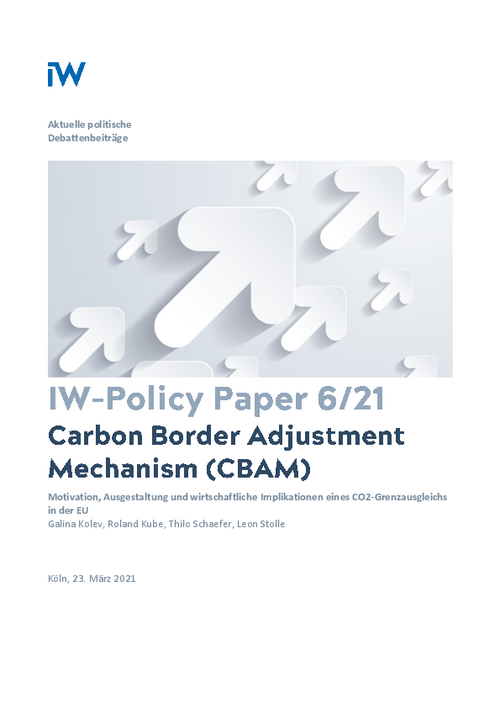The European Green Deal stipulates an increase in the emissions reduction target for 2030 from 40 to 55 percent compared with the base year 1990. This also requires the ramp-up of extensive technology investments for a decarbonization pathway for industry, which tends to entail higher abatement costs.

Carbon Border Adjustment Mechanism (CBAM): Motivation, Design and Economic Implications of a CO2 Limit Offset in the EU
IW-Policy Paper

The European Green Deal stipulates an increase in the emissions reduction target for 2030 from 40 to 55 percent compared with the base year 1990. This also requires the ramp-up of extensive technology investments for a decarbonization pathway for industry, which tends to entail higher abatement costs.
At the same time, only just under 20 percent of global emissions are subject to direct CO2 pricing (World Bank, 2020), and regional CO2 prices tend to be lower than the European certificate price. In order to ensure that the transformation of European industry continues to be compatible with Europe remaining an internationally competitive production location, increasing competitive disadvantages for European manufacturers and the associated growing risk of production and emissions being shifted to non-European locations (carbon leakage) must be contained. As part of its Green Deal, the EU Commission plans to replace the free allocation of emission rights with a border adjustment mechanism (CBAM) on emissions from imported industrial products if they originate from regions with lower CO2 price levels (EC, 2019).
In this paper, we explore the potential design of a CBAM and discuss several issues regarding its implementation. Moreover, we discuss potential impacts using emissions- and trade-intensive industries like steel and cement as an example.
A CBAM may not be able to unerringly prevent leakage of production and associated emissions. Not only is it difficult to ensure ex ante WTO compliance, but retaliatory measures by trading partners can be expected immediately, threatening to severely affect European companies. This urges for a stronger international coordination of climate policy, for example through greater harmonization of CO2 prices or implementation of Article 6 of the Paris Climate Agreement.
The abatement costs per ton of CO2 in the emissions-intensive basic materials industry in particular are significantly higher than the highest CO2 prices applicable to date. The transformation of industrial production toward greenhouse gas neutrality can therefore only succeed if, in addition to making climate-damaging energy sources and processes more expensive, investments in climate-friendly technologies and the operation of corresponding plants are promoted in an incentive-compatible manner. The EU Commission must implement these two sides of the Green Deal coin with its legislation in spring 2021.

Galina Kolev / Roland Kube / Thilo Schaefer/ Leon Stolle: Carbon Border Adjustment Mechanism (CBAM) – Motivation, Ausgestaltung und wirtschaftliche Implikationen eines CO2-Grenzausgleichs in der EU
IW-Policy Paper

More on the topic

Climate Clubs as a Lightning Rod for Tensions in Trade and Industrial Competitiveness
The Paris Agreement has established a transformative paradigm. While this transformation will create winners and losers, it now seems increasingly clear that overall, there are tremendous opportunities.
IW
German Industry's Options for a Secure Supply of Raw Materials
In recent years German industry has seen a rise in the risks attached to its procurement of raw materials.
IW